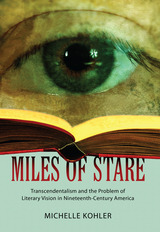
Jack Santino's interviews with retired porters provide extensive firsthand accounts of their work, the job inequities they faced, the formation of the Brotherhood of Sleeping Car Porters, and the aborted Pullman porter strike of 1928. Through the testimony of ran-and-file workers as well as key figures such as E. D. Nixon, the porter who initiated the Montgomery bus boycott and helped launch the career of Martin Luther King, Jr. and C.L. Dellums, the only surviving founding member of the BSCP, Miles of Smiles, Years of Struggle illuminates the Pullman porters' struggle for dignity.

The strangeness of nineteenth-century poetic vision is exemplified most famously by Emerson’s transparent eyeball. That disembodied, omniscient seer is able to shed its body and transcend sight paradoxically in order to see—not to create—poetic language “manifest” on the American landscape. In Miles of Stare, Michelle Kohler explores the question of why, given American transcendentalism’s anti-empiricism, the movement’s central trope becomes an eye purged of imagination. And why, furthermore, she asks, despite its insistent empiricism, is this notorious eye also so decidedly not an eye? What are the ethics of casting a boldly equivocal metaphor as the source of a national literature amidst a national landscape fraught with slavery, genocide, poverty, and war?
Miles of Stare explores these questions first by tracing the historical emergence of the metaphor of poetic vision as the transcendentalists assimilated European precedents and wrestled with America’s troubling rhetoric of manifest destiny and national identity. These questions are central to the work of many nineteenth-century authors writing in the wake of transcendentalism, and Kohler offers examples from the writings of Douglass, Hawthorne, Dickinson, Howells, and Jewett that form a cascade of new visual metaphors that address the irreconcilable contradictions within the transcendentalist metaphor and pursue their own efforts to produce an American literature. Douglass’s doomed witness to slavery, Hawthorne’s reluctantly omniscient narrator, and Dickinson’s empty “miles of Stare” variously skewer the authority of Emerson’s all-seeing poetic eyeball while attributing new authority to the limitations that mark their own literary gazes.
Tracing this metaphorical conflict across genres from the 1830s through the 1880s, Miles of Stare illuminates the divergent, contentious fates of American literary vision as nineteenth-century writers wrestle with the commanding conflation of vision and language that lies at the center of American transcendentalism—and at the core of American national identity.

Has liberalism lost its way--or merely its voice? This book by one of the nation's most insightful, articulate, and powerful Democrats at last breaks the silence that has greeted the Republican Party's revolution of 1994. When voters handed Democrats their worst defeat in 100 years, New Yorkers returned Daniel Patrick Moynihan to the Senate for his fourth term. Amid the wreck of his party's control and the disarray of programs and policies he has championed for three decades, Senator Moynihan here takes stock of the politics, economics, and social problems that have brought us to this pass. With a clarity and civility far too rare in the political arena, he offers a wide-ranging meditation on the nation's social strategies for the last 60 years, as well as a vision for the years to come.
Because Senator Moynihan has long been a defender of the policies whose fortunes he follows here, Miles to Go is in a sense autobiographical, an exemplary account of the social life of the body politic. As it guides us through government's attempts to grapple with thorny problems like family disintegration, welfare, health care, deviance, and addiction, Moynihan writes of "The Coming of Age of American Social Policy." Through most of our history American social policy has dealt with issues that first arose in Europe, and essentially followed European models. Now, in a post-industrial society we face issues that first appear in the United States for which we will have to devise our own responses. Ringing with the wisdom of experience, decency, and common sense, Miles to Go asks "why liberalism cannot be taught what conservatives seem to know instinctively"--to heed the political and moral sentiments of the people and reshape itself for the coming age.
READERS
Browse our collection.
PUBLISHERS
See BiblioVault's publisher services.
STUDENT SERVICES
Files for college accessibility offices.
UChicago Accessibility Resources
home | accessibility | search | about | contact us
BiblioVault ® 2001 - 2024
The University of Chicago Press









